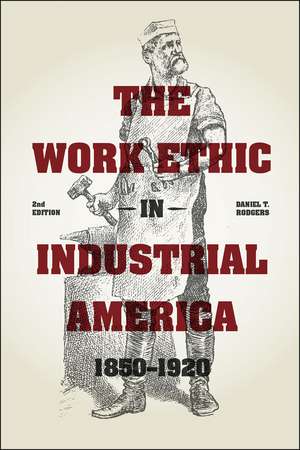The Work Ethic in Industrial America 1850-1920: Second Edition
Autor Daniel T. Rodgersen Limba Engleză Paperback – 10 iul 2014
The phrase “a strong work ethic” conjures images of hard-driving employees working diligently for long hours. But where did this ideal come from, and how has it been buffeted by changes in work itself? While seemingly rooted in America’s Puritan heritage, perceptions of work ethic have actually undergone multiple transformations over the centuries. And few eras saw a more radical shift in labor ideology than the American industrial age.
Daniel T. Rodgers masterfully explores the ways in which the eclipse of small-scale workshops by mechanized production and mass consumption triggered far-reaching shifts in perceptions of labor, leisure, and personal success. He also shows how the new work culture permeated society, including literature, politics, the emerging feminist movement, and the labor movement.
A staple of courses in the history of American labor and industrial society, Rodgers’s sharp analysis is sure to find a new audience, as twenty-first-century workers face another shift brought about by technology. The Work Ethic in Industrial America 1850–1920 is a classic with critical relevance in today’s volatile economic times.
Daniel T. Rodgers masterfully explores the ways in which the eclipse of small-scale workshops by mechanized production and mass consumption triggered far-reaching shifts in perceptions of labor, leisure, and personal success. He also shows how the new work culture permeated society, including literature, politics, the emerging feminist movement, and the labor movement.
A staple of courses in the history of American labor and industrial society, Rodgers’s sharp analysis is sure to find a new audience, as twenty-first-century workers face another shift brought about by technology. The Work Ethic in Industrial America 1850–1920 is a classic with critical relevance in today’s volatile economic times.
Preț: 150.85 lei
Preț vechi: 184.74 lei
-18% Nou
Puncte Express: 226
Preț estimativ în valută:
28.87€ • 29.94$ • 24.07£
28.87€ • 29.94$ • 24.07£
Carte indisponibilă temporar
Doresc să fiu notificat când acest titlu va fi disponibil:
Se trimite...
Preluare comenzi: 021 569.72.76
Specificații
ISBN-13: 9780226136233
ISBN-10: 022613623X
Pagini: 336
Dimensiuni: 140 x 216 x 28 mm
Greutate: 0.37 kg
Ediția:Second Edition
Editura: University of Chicago Press
Colecția University of Chicago Press
ISBN-10: 022613623X
Pagini: 336
Dimensiuni: 140 x 216 x 28 mm
Greutate: 0.37 kg
Ediția:Second Edition
Editura: University of Chicago Press
Colecția University of Chicago Press
Notă biografică
Daniel T. Rodgers is the Henry Charles Lea Professor of History emeritus at Princeton University. He is the author of Contested Truths: Keywords in American Politics, Atlantic Crossings: Social Politics in a Progressive Age, and Age of Fracture.
Cuprins
Preface to the Second Edition
Acknowledgments
Introduction
1. Work Ideals and the Industrial Invasion
2. Hireling Laborer
3. “Mechanicalized” Men
4. Play, Repose, and Plenty
5. Splinterings: Fables for Boys
6. Sons of Toil: Industrial Workers and Their Labor
7. Idle Womanhood: Feminist Versions of the Work Ethic
8. The Political Uses of Work Rhetoric
Epilogue: Charles W. Eliot and the Quest for Joyful Labor
Notes
Index
Acknowledgments
Introduction
1. Work Ideals and the Industrial Invasion
2. Hireling Laborer
3. “Mechanicalized” Men
4. Play, Repose, and Plenty
5. Splinterings: Fables for Boys
6. Sons of Toil: Industrial Workers and Their Labor
7. Idle Womanhood: Feminist Versions of the Work Ethic
8. The Political Uses of Work Rhetoric
Epilogue: Charles W. Eliot and the Quest for Joyful Labor
Notes
Index
Recenzii
"The Work Ethic in Industrial America is a brilliant and morally acute examination of the rhetoric of work in the United States. Its republication is timely in two ways. Not only are work and the work ethic being again radically transformed, but so is historiography. Written just before intellectual and social history separated and diverged, this edition comes when these fields are reconvening. What a wonderful model it offers for future work!"
“A delight to read.”
